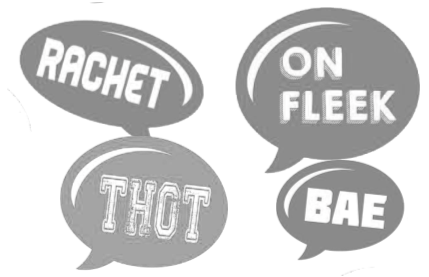Students slay slang
Ah slang, or whatever the kids are calling it these days.
You hashtag everything, and you’re “sorry not sorry”—whatever that means.
And everything is “bae,” whether a boyfriend or a pizza, because those two things are exactly the same.
“I thought it was just people trying to say ‘babe,’ but just forgot the rest of the word,” Giselle Briand ’17 said.
Alexandra Krubski, a science teacher, doesn’t approve of the term either.
“Bae? No, that’s ridiculous. Just use the real word,” she advised.
Back in the day, in the early 2000s, teens had their “peeps”. Not friends, “peeps”. Because that’s what all the cool kids said.
“I’d go play Scrabble with my peeps,” Krubski said. “I mean my friends, though, not like the marshmallow treat.”
And Yolo? Pshh, lame! Antonio Coccoli, a science teacher, said he used the latin term “carpe diem” in school, or “seize the day” in English, because “it’s the real Yolo,” he said.
And nowadays, people are either “ratchet” or “on fleek.” Rachet, according to “Collins Dictionary,” is “the classiest way of calling someone brash and ignorant.”
In a sentence, someone might say, “OMG, look at that rachet girl my ex is dating, hashtag rude.”
Meanwhile, “on fleek” is a more endearing term. It’s another word for “on point” or, more simply, “good.”
But the little word has a pretty bad reputation.
According to “English Language and Usage,” the term “on fleek” is the 15th most hated word of 2014.
And Jessica Spector ’15 agrees with the statistic that “fleek” isn’t actually “on fleek”.
“It sounds kinda ratchet,” Spector said. “They’re like, ‘Oh my God, outfit on fleek doe.’ No, take it somewhere else, not on my feed.”
Although some slang nowadays is pretty harmless, some other words aren’t so nice.
“Thot,” for instance, is an acronym for “that ho over there,” and has sparked much controversy in the Staples community due to it’s explicit meaning.
“That’s wrong,” Harrison King ’16 said. “People shouldn’t be treating women like that.”
And Marta Clanton ’17, after a quick overview of it’s meaning, agreed.
“It’s kind of sexist when you really think about it,” Clanton said.
Meanwhile, Kaela O’Kelly ’15 wasn’t as phased.
“It’s not mean at all,” O’Kelly said. “It’s empowering women.”
In fact, according to O’Kelly, “I’m a thot, you’re a thot, we’re all thots. It’s a thot-eat-thot world.”
Another controversial term is “basic”.
Jacob Offir ’16 doesn’t have any issue with the word–in fact, he loves it.
“Oh, I love basic,” Offir smiled. “Like why are you so basic?”
Yet, often used in reference to white women and in association with Starbucks and Uggs, many find the popular term offensive and even sexist.
“Is there such thing as a basic white boy?” Emma Cataldo ’16 questioned. “No,” she said.
And Clanton agreed.
“You’ll see a row of guys all wearing khakis, all wearing Nike elites, but still you’d never hear a guy called ‘basic,” Clanton added.
And then “fetch” came back into style. Just kidding, nobody says “fetch” anymore.
Stop trying to make “fetch” happen. It’s not going to happen!
















































